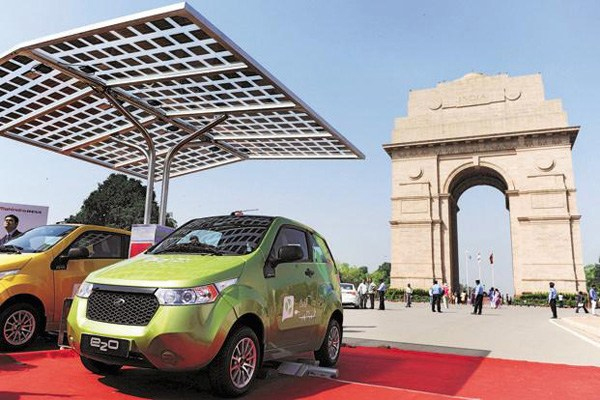By Mr. Abhishek Shukla, Marketing and Vendor Development. Saison Components & Solutions
 Electric vehicle market overview and its growth in India
Electric vehicle market overview and its growth in India
India, world’s 5th largest auto maker is readying for a massive transformation by moving completely towards Electric vehicles by 2030. Being a part of Shri Narendra Modi government’s vision, the shift was inevitable if not imminent because of some reasons like the Paris climate agreement, India’s huge oil imports etc.
Country is targeting to achieve 6-7 million of EV by 2020 under the FAME scheme.
India’s EV industry is a new born baby when compared with the international markets such as US, China & Europe which are much matured.
China being the major share taker having 50% is way ahead than India with the country’s share being 0.1%. However, the good news is that a positive change is definitely anticipated with major push by the government by various initiatives like planning to spend largely on subsidising local companies and also providing incentives to the consumers like a 2 wheeler EV buyer is eligible for Rs. 22000, 3 wheeler EV buyer for Rs 25000 and for a 4 wheeler buyer about Rs. 1.87 Lakhs of subsidy is planned.
200 charging stations are also proposed to be in Delhi, Jaipur & Chandigarh.
As supporting EV’s definite growth, the union budget FY 2017-2018 had allocated Rs. 795 crore for the development of EV’s.
Opportunities in EV market
Considering the size of the market, everyone wants to enter and get a piece of pie of the EV market.
India’s Maharatna & Navratna companies such as NTPC, BHEL & PGCIL are hoping to secure PAN India licence for setting up of charging stations for Electric Vehicles in order to remain relevant in the uncertain and evolving energy landscape of the country.
Moreover, for the energy firms, setting up a charging infrastructure is an attractive prospect, given the lucrative market potential projected to be around 90 billion units (BU) of electricity. For comparison, India generated 1,107 BU in 2015-16.
Will it drive electronics components market?
Yes it will definitely drive the electronic components market as electronic components play a very important role in working of electric vehicle moreover, for the charging of electric vehicle the chargers used also uses a lot of components such as IC’s, MOSFET’s, IGBT’s etc.
Recently, EESL invited the bid for 2000 electric vehicle chargers which was earlier planned for 4000 chargers and will now be in multiple phases considering all the eligible players and total market demand.
Moreover, the use of supercapacitor in the electric vehicle will be a must in the future.
Saison assures of playing an important role in the electric Vehicle market in future by making a hybrid battery.
Key challenges
Major challenge would be the adaption of Electric Vehicle and getting the entry into the automotive ecosystem as it may create a big disruption in the ecosystem of vehicles that run on internal combustion engines and it may have an effect on several jobs. Other than this, many other hindrances are there such as India being not having enough lithium reserves for manufacturing lithium-ion batteries. This could lead to a substantial change in the country’s energy security priorities, with securing lithium supplies, a key raw material for EV batteries, becoming as important as buying oil and gas fields overseas.
The future of EV
Future seems very bright The National Democratic Alliance (NDA) government wants only electric vehicles to ply on India’s roads by 2030 as part of its commitment to reduce greenhouse gas emissions under the global agreement on climate change, and to reduce spending on oil imports, which, according to one estimate, could double to an annual $300 billion by that year.
Coming up with India’s state-owned EESL awarding a Rs. 1120 crore order in September’17 to TATA Motors Ltd to supply 10k electric cars which had to be in 2 phases of 1st being of 500 by November end and 9500 cars in the second phase. Tata Motors Ltd won the EESL contract, with Mahindra and Mahindra Ltd matching its bid and winning 30% of the order.
The vehicles will be procured at a per-unit price of Rs11.2 lakh with the aim of laying the foundation for a mass shift to EVs by 2030.
EESL’s business model is to make these vehicles available on lease to the government and its agencies for around Rs 45,000 per month, which is Rs5,000 less than what is currently paid for petrol and diesel cars.
There are many government initiatives like for instance, under the new goods and services tax (GST) regime starting 1 July, EVs are being taxed at 12%, compared with 28% being levied on petrol and diesel vehicles.
Referring to a report of Live mint. From Finnish state-controlled energy utility Fortum which plans to develop EV charging infrastructure in India, to billionaire Sajjan Jindal’s JSW Group which is exploring a partnership with China’s Zhejiang Geely Holding Group Co. to make EVs, the list of investors drawn to India’s EV sector is quite long.
Swiss stock exchange-listed Leclanché SA also plans to partner with SUN Mobility for developing battery storage solutions.
From China’s Zhuhai Yinlong New Energy Ltd, which plans to set up an EV manufacturing plant in Punjab, to BP Plc, which is planning to leverage its partnership with Reliance Industries Ltd to explore unconventional mobility solutions, nobody wants to be left behind.
“It (EVs) is gaining a lot of momentum. There is a lot of talk,” said Malcolm Wrigley, country manager, India, for French energy firm Engie SA, in an interview.
To a question on whether Engie would be interested in setting up EV car charging infrastructure in India, Wrigley said, “That certainly is on the agenda.”
Currently, Mahindra & Mahindra Ltd is the only automaker selling a fully electric car in the country, while others including Maruti Suzuki India Ltd and Toyota Motor Corp. offer hybrid versions.







